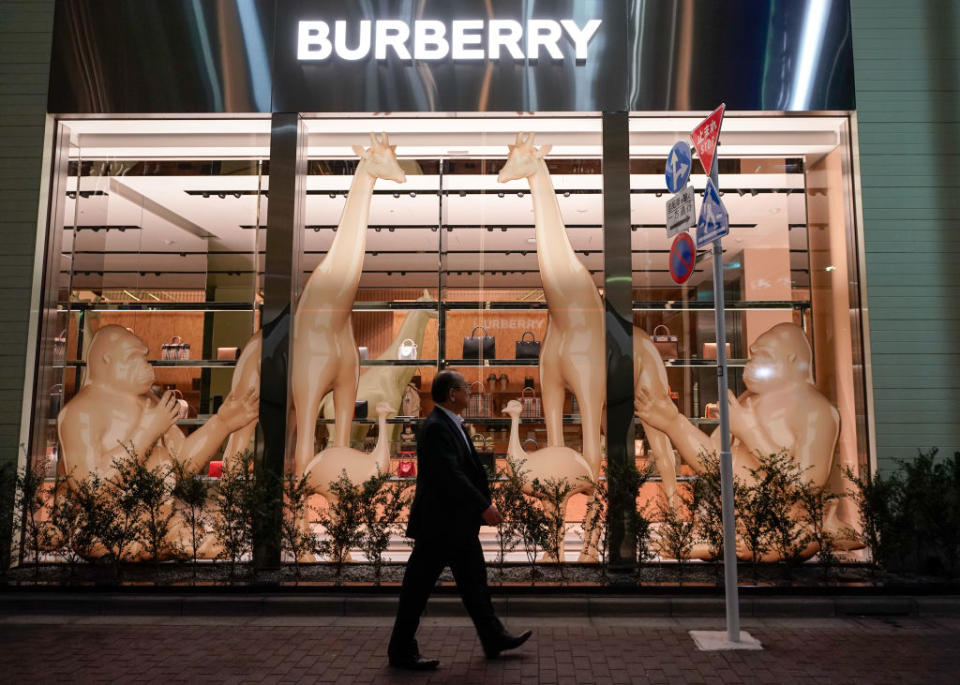Burberry share price slumps as ‘quiet luxury’ trend takes hold of shoppers

Shares in Burberry slumped over five per cent on Wednesday in the latest display of investors waning confidence in the luxury fashion industry.
The maker of trench coats and tartan scarfs said operating profit fell to £418m in line with the lowered guidance it predicted in January.
Hopes of an immediate rebound were also quashed as the British fashion house warned wholesale revenue is to fall by around -25 per cent in the first half of the year.
Unlike brands such as Hermes – which has outstripped rivals thanks to its recession-immune and Birkin Bag obsessed client base – Burberry’s accessibility has meant many of its customers are feeling the squeeze.
The 103 year old brand is not alone in this struggle.
Leather handbag maker Mulberry reported a four per cent decline in revenue in the year ending March, blaming a slowdown in sales in the UK and Asia.
A recent study by wealth management firm Saltus showed 16.29 per cent of cash rich Brits had cut down on their personal spending due to financial pressures.
Some 15.78 per cent also said they had cut down on luxury items and designer clothes.
Mike Stimpson, partner at Saltus, said: “We know first-hand from clients that high net worth individuals are reducing their spending in light of current economic conditions as they need to prioritise spending on essential costs including mortgages and supporting their families.
“While this reduction is not limited entirely to personal spending on luxury items, it is inevitable that brands like Burberry feel the impact, although different businesses will clearly respond differently to these pressures.”
Yanmei Tang, analyst at Third Bridge, said: “Burberry is struggling to clearly define and elevate its brand identity, resulting in confusing messaging and poor sales growth. There is too much reliance on a new creative direction rather than making operational changes.”
“Burberry needs to take risks by launching innovative products to succeed. But they also face investor pressure and resource constraints as a standalone brand compared to giants like LVMH and Kering.”
She added: “Burberry heavily relies on wholesale for revenue and will need to use promotions due to financial pressure.”
“Predictions suggest continued challenges in 2024, with the US wholesale business likely to decline further. Over-reliance on wholesale has harmed the brand’s image and margins, despite boosting sales.”
For Burberry, sales in Asia grew by just three per cent over the course of the year, hindered by a 17 per cent drop in the fourth quarter.
And Americas-spending fell a full 12 per cent across the year.
It mirrors the plight of Gucci owner Kerring who also blamed the once lucrative Asian market for lagging following strict Covid-19 restrictions.
Alongside recovery from the pandemic, China’s economy has been buffeted by a property crisis and high levels of youth unemployment.
This, coupled with what has been dubbed a “richcession” in other western markets, has hindered sales of designer brands.
Burberry’s shares have more than halved in the past year, leaving the stock price back near the lows plumbed during the early stages of the pandemic.
Its chief Jonathan Akeroyd, said its turnaround plan will focus on Burberry positioning itself as a ‘Modern British Luxury brand’.
It comes amid a growing rise in the ‘quiet luxury’ dress style as fashion conscious shoppers look to invest in sophisticated pieces which are not obviously designer brands.
Victoria Scholar, head of investment at interactive investor, said: “The shift away from bold patterns like the tartan check that Burberry is best known for towards much more discreet ‘quiet luxury’ trends instead has hurt the luxury brand which is struggling to find favour among the fickle fashionistas.
“The luxury industry more broadly tends to be highly correlated with the strength of the Chinese economy, given that shoppers in China typically account for around a third of global sales.”
She added: “And with the world’s second largest economy facing pressures from its ailing real estate sector and a sluggish emergence from the pandemic, Burberry is intensely feeling the squeeze.”
“There’s a negative assessment from the analyst community too with 17 holds, three sells and no buys on the stock with an average price target down nearly six per cent from Burberry’s current share price.”

 Yahoo Finance
Yahoo Finance 